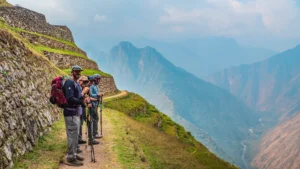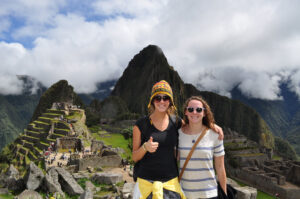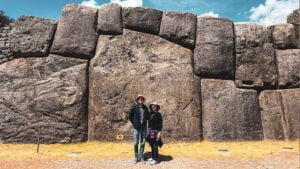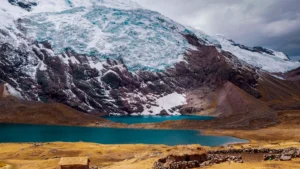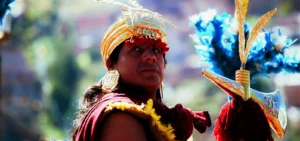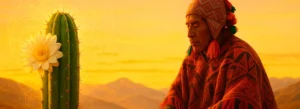Pacha Mama: Exploring the Sacred Connection Between Humans and Mother Earth
In our modern society, we often find ourselves disconnected from the natural world that sustains us. But there are cultures, such as the indigenous peoples of South America.
In this article, we will delve into the concept of Pacha Mama, which translates to “Mother Earth” in Quechua, the language of the Incas. With a deep reverence for nature, Pacha Mama is not just seen as a physical entity, but as a living being deserving of our respect and care.
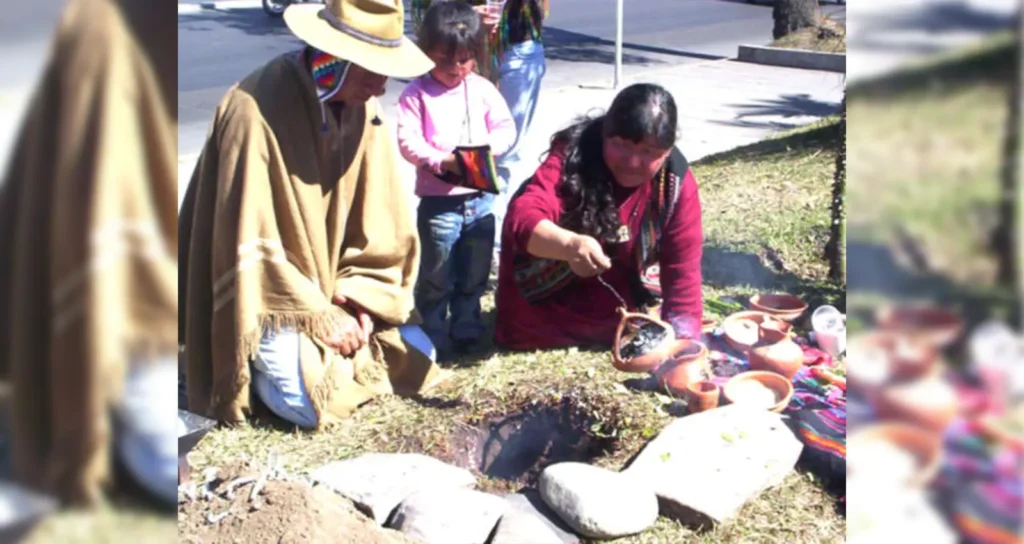
Through rituals, ceremonies, and daily practices, indigenous communities honor and nourish their relationship with Pacha Mama. They understand that our well-being is inexorably tied to the health of the Earth. By exploring this ancient wisdom, we can gain a new perspective on our place in the world and the responsibility we have to protect and preserve our planet.
Join us as we uncover the beauty and significance of Pacha Mama, and delve into the sacred connection between humans and Mother Earth that has been cherished for generations. Let us learn from the wisdom of those who have never forgotten the importance of living in harmony with nature.
The concept of Pacha Mama in indigenous cultures
Pacha Mama, which translates to “Mother Earth” in Quechua, the language of the Incas, is a deeply revered concept in the indigenous cultures of South America. For these communities, Pacha Mama is not just a physical entity, but a living, breathing being deserving of utmost respect and care. The indigenous peoples of the Andes, the Amazon, and beyond have long understood that their well-being is intrinsically linked to the health and vitality of the natural world around them.
This sacred connection to Pacha Mama is rooted in a worldview that sees the Earth as a living, sentient being, a mother who nurtures and sustains all life. In this perspective, humans are not separate from nature, but rather an integral part of the interconnected web of life. The Andean concept of Pacha Mama reflects a holistic understanding of the world, where all elements – the land, the water, the air, and the living creatures – are imbued with a divine essence and deserve reverence and protection.
This reverence for Pacha Mama is not just a philosophical or spiritual belief, but a way of life that is deeply embedded in the cultural practices and daily routines of indigenous communities. From the Quechua and Aymara peoples of the Andes to the Amazonian tribes, the sacred connection to Mother Earth is woven into the fabric of their existence, shaping their relationship with the land, their agricultural practices, and their rituals and celebrations. By honoring Pacha Mama, these communities ensure the continued abundance and balance of the natural world, fostering a sustainable and harmonious way of living.
The importance of the sacred connection between humans and Mother Earth
The sacred connection between humans and Mother Earth, as embodied by the concept of Pacha Mama, is of paramount importance for the well-being of our planet and all its inhabitants. This deep reverence for the natural world is not just a quaint tradition, but a vital worldview that holds the key to a more sustainable and balanced future.
At the heart of this connection is the understanding that humans are not separate from nature, but rather an intrinsic part of it. We are not the masters of the Earth, but its stewards, responsible for protecting and nurturing the delicate balance of the ecosystems that sustain us. The indigenous cultures that have maintained this sacred bond with Pacha Mama have long recognized the interdependence between human and environmental health, and have developed practices and beliefs that reflect this awareness.
By honoring Pacha Mama, these communities have been able to live in harmony with the natural world, drawing on its abundance while also ensuring its continued vitality. They have developed sustainable agricultural practices, respected the cycles of the land, and revered the sacred elements of water, air, and soil. This holistic approach to living in balance with nature stands in stark contrast to the extractive, exploitative, and often destructive practices that have become the norm in much of the modern world.
As we grapple with the pressing environmental challenges of our time, such as climate change, biodiversity loss, and resource depletion, the wisdom and practices of indigenous cultures offer a vital blueprint for a more sustainable future. By reconnecting with the sacred connection between humans and Mother Earth, we can learn to live in a way that respects and nourishes the natural world, rather than depleting and degrading it. This shift in perspective is not just a matter of environmental stewardship, but a fundamental transformation in our relationship with the planet we call home.
Practices and rituals honoring Pacha Mama
The sacred connection between humans and Mother Earth, as embodied by the concept of Pacha Mama, is expressed through a rich tapestry of practices and rituals that have been passed down through generations in indigenous communities. These traditions not only honor the divine essence of the natural world, but also serve to strengthen the bond between the people and the land they inhabit.
One of the most prominent practices in honoring Pacha Mama is the ritual of offering, known as the Despacho ceremony. In this ceremony, indigenous communities gather to create a ceremonial offering, often consisting of a variety of symbolic elements such as flowers, grains, coca leaves, and other natural materials. The Despacho is then offered to Pacha Mama, either through a ritual burning or by being buried in the earth, as a way of expressing gratitude, making requests, and maintaining the sacred balance between humans and the natural world.
Another important practice is the celebration of the Inti Raymi, the Inca festival of the sun, which takes place during the winter solstice in the Andes. This festival is a time of renewal and celebration, honoring the sun as a sacred life-giving force and its connection to Pacha Mama. Through music, dance, and shared feasts, the Inti Raymi brings the community together in a collective expression of reverence for the Earth and the rhythms of the natural world.
In addition to these large-scale rituals, indigenous communities also incorporate daily practices that keep them connected to Pacha Mama. This may include the ritual of giving thanks before a meal, the practice of leaving offerings at sacred sites, or the careful observation of the cycles of the moon and the seasons. These small, yet meaningful, acts serve to maintain a constant awareness of the sacred relationship between humans and the natural world.
The role of Pacha Mama in sustainable living
The concept of Pacha Mama, with its deep reverence for the natural world, has played a vital role in shaping the sustainable living practices of indigenous communities throughout South America. By recognizing the Earth as a living, sentient being deserving of respect and care, these cultures have developed ways of interacting with the land that prioritize balance, reciprocity, and long-term stewardship.
One of the key ways in which Pacha Mama has influenced sustainable living is through the development of traditional agricultural practices. Indigenous farmers have long understood the importance of working in harmony with the land, respecting the natural cycles of growth and rest, and maintaining the diversity of crops and ecosystems. This approach has allowed them to cultivate the land in a way that is both productive and regenerative, ensuring the continued abundance of the Earth’s resources.
Similarly, the respect for Pacha Mama has also shaped the way indigenous communities manage their natural resources, such as water and forests. By recognizing the sacred nature of these elements, they have developed practices that prioritize conservation, equitable distribution, and the preservation of delicate ecosystems. This has allowed them to thrive in their environments for centuries, without depleting or degrading the resources they depend on.
Moreover, the sacred connection to Pacha Mama has also influenced the way indigenous communities organize their social and cultural structures. Many of these societies have developed systems of collective decision-making, communal land ownership, and shared responsibility for the well-being of the community and the land. This holistic approach to living reflects the understanding that human and environmental health are inextricably linked, and that the prosperity of the community is tied to the health of the natural world.
The impact of modernization on the sacred connection with Mother Earth
As the world has become increasingly interconnected and globalized, the sacred connection between humans and Mother Earth, as embodied by the concept of Pacha Mama, has faced significant challenges and threats. The rapid pace of modernization, industrialization, and economic development has put immense pressure on the traditional ways of life and the delicate balance that indigenous communities have maintained for generations.
One of the primary impacts of modernization has been the displacement and disruption of indigenous communities from their ancestral lands. As resource extraction, urban expansion, and large-scale agricultural projects have encroached on their territories, many indigenous peoples have been forced to abandon their traditional practices and ways of life. This not only severs their physical connection to the land, but also disrupts the spiritual and cultural ties that are so deeply rooted in Pacha Mama.
Moreover, the influx of Western-style development and consumerism has also had a significant impact on the traditional values and beliefs of indigenous communities. The emphasis on individualism, material accumulation, and the exploitation of natural resources stands in stark contrast to the holistic, communal, and sustainable approach to living that is central to the Pacha Mama worldview. As indigenous communities are increasingly integrated into the global economic system, they face the challenge of preserving their sacred connection to the Earth while navigating the pressures of modernization.
The loss of traditional knowledge and practices related to Pacha Mama is another significant impact of modernization. As younger generations are drawn to the lure of urban centers and Western-style education and employment, the intergenerational transmission of this ancient wisdom is under threat. This erosion of cultural heritage not only weakens the connection to the land, but also deprives humanity of invaluable insights and solutions for living in harmony with the natural world.
Ways to reconnect with Pacha Mama in everyday life
While the sacred connection between humans and Mother Earth, as embodied by the concept of Pacha Mama, may seem distant and foreign to those of us living in the modern, industrialized world, there are ways in which we can reconnect with this profound wisdom in our everyday lives.
One of the most important steps is to cultivate a deep sense of gratitude and reverence for the natural world around us. This can be as simple as taking a moment each day to appreciate the beauty of the sky, the trees, or the birds that grace our lives. By acknowledging the divine essence of the Earth and all its elements, we can begin to shift our perspective and see ourselves as an integral part of the interconnected web of life, rather than as separate and superior.
Another way to reconnect with Pacha Mama is to engage in practices that honor the cycles of nature. This may include aligning our daily routines with the rhythms of the sun and the moon, or incorporating rituals and ceremonies that celebrate the changing of the seasons. By attuning ourselves to the natural world, we can develop a deeper understanding of our place within it and the responsibilities we have to care for it.
Furthermore, we can support and engage with indigenous communities and organizations that are working to preserve and revitalize the sacred connection to Pacha Mama. This may involve learning about their traditional practices, supporting their efforts to protect their lands and resources, or participating in cultural exchanges and educational programs. By amplifying the voices and experiences of those who have maintained this ancient wisdom, we can help to ensure that it continues to thrive and inspire us all.
Organizations and movements promoting the sacred connection with Mother Earth
As the world grapples with the pressing environmental challenges of our time, there has been a growing recognition of the vital importance of the sacred connection between humans and Mother Earth, as embodied by the concept of Pacha Mama. This has led to the emergence of various organizations and movements that are dedicated to preserving and revitalizing this ancient wisdom and its practical applications for sustainable living.
One such organization is the Pachamama Alliance, a non-profit that works closely with indigenous communities in the Amazon rainforest to protect their lands and support their traditional way of life. Through educational programs, advocacy efforts, and community-based initiatives, the Pachamama Alliance aims to inspire a global shift in consciousness, helping people to reconnect with the sacredness of the natural world and to take action to protect it.
Another important initiative is the Global Ecovillage Network (GEN), which promotes the development of sustainable, resilient, and spiritually-grounded communities around the world. Many of the ecovillages within the GEN network have been inspired by the principles of Pacha Mama, incorporating traditional ecological knowledge, communal living, and a deep reverence for the Earth into their design and practices.
At the grassroots level, there are also numerous indigenous-led organizations and movements that are working to preserve and revitalize the sacred connection to Pacha Mama. These include groups like the Confederation of Indigenous Nationalities of Ecuador (CONAIE), which has been at the forefront of the fight to protect indigenous rights and the environment, and the Pachamama Movement, a global network of activists and communities committed to the defense of Mother Earth.
The future of the sacred connection with Pacha Mama
As we look to the future, the sacred connection between humans and Mother Earth, as embodied by the concept of Pacha Mama, holds immense promise and potential for addressing the pressing environmental and social challenges of our time. While the forces of modernization and globalization have posed significant threats to this ancient wisdom, there is a growing recognition of its vital importance for the well-being of our planet and all its inhabitants.
One of the key ways in which the Pacha Mama worldview can shape a more sustainable and equitable future is through the preservation and revitalization of indigenous knowledge and practices. By amplifying the voices and experiences of those who have maintained a deep reverence for the natural world, we can learn invaluable lessons about sustainable land management, resource stewardship, and community-based decision-making. This exchange of knowledge and the incorporation of indigenous perspectives into mainstream discourse and policymaking can be a powerful catalyst for transformative change.
Moreover, the sacred connection to Pacha Mama offers a profoundly holistic and interconnected understanding of the world, one that recognizes the inherent dignity and agency of the natural world and the profound interdependence between human and environmental health. As we grapple with the complex challenges of our time, from climate change to social inequality, this perspective can provide a guiding framework for developing integrated, systemic solutions that address the root causes of these issues.
Ultimately, the future of the sacred connection with Pacha Mama will depend on our collective willingness to listen, learn, and act in service of the Earth and all its inhabitants. By fostering a deep reverence for the natural world, embracing traditional ecological knowledge, and cultivating a sense of shared responsibility for the well-being of our planet, we can work towards a future that is more sustainable, equitable, and in harmony with the rhythms and cycles of Mother Earth.
Pachamamam with Allyn Pacha Peru Tours
In a world that is increasingly disconnected from the natural world, the concept of Pacha Mama, or Mother Earth, offers a profound and transformative perspective. This sacred connection between humans and the Earth, as embodied by the indigenous cultures of South America, is a vital wisdom that holds the key to a more sustainable and balanced future.
Through rituals, ceremonies, and daily practices, these communities have maintained a deep reverence for the Earth, recognizing it as a living, sentient being deserving of our utmost respect and care. This holistic worldview, which sees humans as an integral part of the interconnected web of life, has shaped sustainable agricultural practices, resource management, and social structures that prioritize the well-being of the land and its inhabitants.
As we grapple with the pressing environmental and social challenges of our time, the wisdom of Pacha Mama offers a vital blueprint for a more harmonious and regenerative way of living. By reconnecting with the sacred connection between humans and Mother Earth, we can learn to live in balance with the natural world, drawing on its abundance while also ensuring its continued vitality.
Through the preservation and revitalization of indigenous knowledge, the amplification of indigenous voices, and the incorporation of Pacha Mama principles into mainstream discourse and policymaking, we can work towards a future that is more sustainable, equitable, and in alignment with the rhythms and cycles of our living, breathing planet. Let us heed the call of Pacha Mama and embrace the sacred connection that can guide us towards a more harmonious and resilient world.


